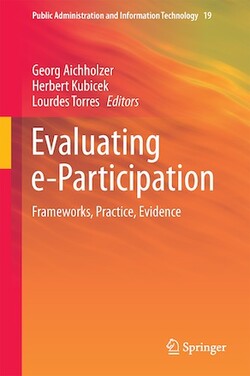Evaluating e-Participation
This book...
...offers an empirical assessment of e-participation based on a quasi-experimental field study,
...investigates both theoretical and practical evaluation implications of information, consultation and collaboration within e-collaboration,
...investigates the main currents of the contemporary academic debate on evaluating e-participation, and enriches the issues at stake with systematic empirical studies and examples in Europe.
There is a widely acknowledged evaluation gap in the field of e-participation practice and research, a lack of systematic evaluation with regard to process organization, outcome and impacts. This book addresses the state of the art of e-participation research and the existing evaluation gap by reviewing various evaluation approaches and providing a multidisciplinary concept for evaluating the output, outcome and impact of citizen participation via the Internet as well as via traditional media. It offers new knowledge based on empirical results of its application (tailored to different forms and levels of e-participation) in an international comparative perspective. The book will advance the academic study and practical application of e-participation through fresh insights, largely drawing on theoretical arguments and empirical research results gained in the European collaborative project “e2democracy”. It applies the same research instruments to a set of similar citizen participation processes in seven local communities in three countries (Austria, Germany and Spain). The generic evaluation framework has been tailored to a tested toolset, and the presentation and discussion of related evaluation results aims at clarifying to what extent these tools can be applied to other consultation and collaboration processes, making the book of interest to policymakers and scholars alike.
